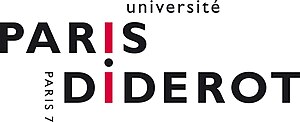Université Denis Diderot
|
Université Paris 7
| |

| |
| Type | Public |
|---|---|
| Established | 1971, following the division of the University of Paris (c. 1150–1970) |
| Chancellor |
Maurice Quénet Chancellor of the Universities of Paris |
| President | Christine Clerici |
| Students | 26,000 |
| Location |
Paris, France 48°49′47″N 2°22′51″E / 48.829722°N 2.380833°E |
| Website | www.univ-paris-diderot.fr |
Coordinates: 48°49′47″N 2°22′51″E / 48.82972°N 2.38083°E
Paris Diderot University, also known as Paris 7 (French: Université Paris Diderot (Paris 7)), is a French university located in Paris, France.
It was one of the heirs of the University of Paris, which ceased to exist in 1970. Professors from the faculties of Science, of Medicine and of Humanities chose then to create a new multidisciplinary university. It adopted its current name in 1994 after the 18th-century French philosopher, art critic and writer Denis Diderot.
With two Nobel Prize laureates, two Fields Medal winners and two former French Ministers of Education among its faculty or former faculty, the university is famous for its teaching in science, especially in mathematics. Indeed, many fundamental results of the theory of probability have been discovered at one of its research centres, the Laboratoire de Probabilités et Modèles Aléatoires (Laboratory of Probability and Random Models). The university is also known for its teaching in psychology, which adopts a specific approach that draws from both psychopathology and psychoanalysis.
The university also hosts many other disciplines: currently, with 2,300 educators and researchers, 1,100 administrative personnel and 26,000 students studying humanities, science or medicine.
...
Wikipedia
